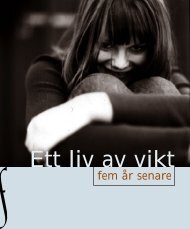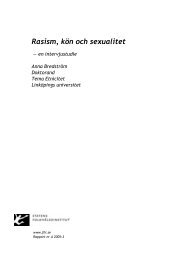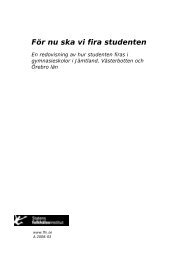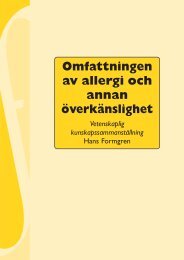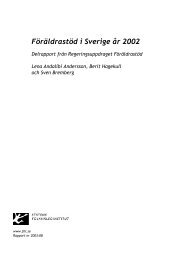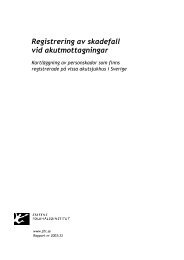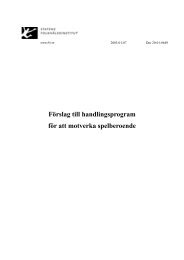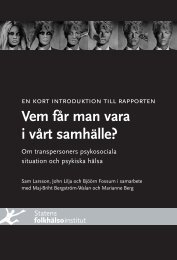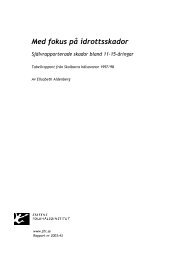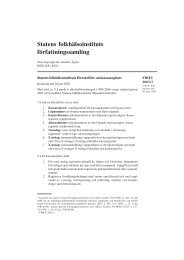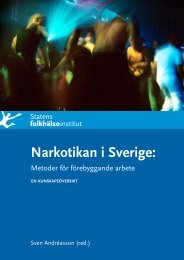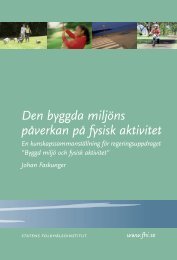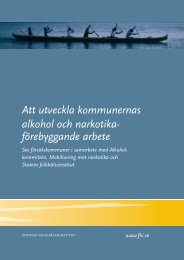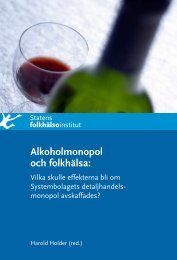Hälsa och välfärd hos barn och unga med funktionsnedsättning
Hälsa och välfärd hos barn och unga med funktionsnedsättning
Hälsa och välfärd hos barn och unga med funktionsnedsättning
Create successful ePaper yourself
Turn your PDF publications into a flip-book with our unique Google optimized e-Paper software.
HÄLSA OCH VÄLFÄRD HOS BARN OCH UNGA MED FUNKTIONSNEDSÄTTNING 9<br />
children with predominantly neuropsychiatric disorders are a particularly vulnerable<br />
group.<br />
Children with disabilities are generally as physically active as children without<br />
disabilities. Children with predominantly neuropsychiatric disorders are less<br />
physically active, while children with primarily physical disabilities however, are<br />
more physically active than children without disabilities. Children with only allergic<br />
diseases are as physically active as children without disabilities. It is somewhat more<br />
common for parents of children with moderate or severe disabilities to discuss issues<br />
related to health and fitness activities compared to parents of children without<br />
disabilities. In terms of type of disability, it is a larger proportion of parents of<br />
children with primarily physical disabilities who discuss such matters compared to<br />
parents of children without disabilities.<br />
Children with disabilities are less satisfied in school and are more exposed to<br />
bullying than children without disabilities. It is mainly children with<br />
neuropsychiatric disorders who are less satisfied in school. A contributing factor<br />
may be that this group, according to their parents, perform worse in school and are<br />
more vulnerable to bullying. Even children with primarily physical disabilities and<br />
children with moderate or severe disabilities are particularly prone to bullying.<br />
Children with disabilities read fewer books, but participate in club activities, play<br />
instruments and go to the cinema to the same extent as children without disabilities.<br />
Children with moderate or severe disabilities or mainly neuropsychiatric disorders<br />
spend less time with peers.<br />
There are clear disparities in self-reported health between children with disabilities<br />
and children without disabilities. Children with disabilities have poorer self-reported<br />
health. Children with mild, moderate or severe disabilities experience more mental<br />
health problems and more stress-related symptoms in their daily lives compared to<br />
children without disabilities. In terms of type of disability, we see that it is mainly<br />
children with primarily physical or neuropsychiatric disorders that experience these<br />
problems, whereas children with only allergic diseases have symptoms nearly as<br />
seldom as children without disabilities.<br />
Even parents of children with disabilities have poorer self-reported health than<br />
parents of children without disabilities. They have more mental health problems and<br />
more stress-related symptoms. Symptoms are most common among parents of<br />
children with moderate or severe disabilities as well as among parents of children<br />
with predominantly neuropsychiatric disorders.<br />
In sum, there are differences between children with disabilities and children without<br />
disabilities in several of the investigated areas. This applies in particular to living<br />
conditions, school and health. The differences are smaller when it comes to physical<br />
activity and leisure activities. We see that children with disabilities need further<br />
attention in schools, especially when it comes to preventing children from being<br />
bullied. We also find that parents of children with disabilities are more economically<br />
disadvantaged and have worse health than parents of children without disabilities.<br />
STATENS FOLKHÄLSOINSTITUT



